#Arpinum
Explore tagged Tumblr posts
Photo

Cicero
Marcus Tullius Cicero was a Roman orator, statesman, and writer. He was born on 6 January 106 BCE at either Arpinum or Sora, 70 miles south-east of Rome, in the Volscian mountains. His father was an affluent eques, and the family was distantly related to Gaius Marius. He is not to be confused with his son (of the same name) or Quintus Tullius Cicero (his younger brother). Cicero died on 7 December 43 BCE, trying to escape Rome by sea.
Early Life & Political Career
Cicero was sent to Rome to study law under the Scaevolas, who were the equivalent Ciceros of their day, and he also studied philosophy under Philo, who had been head of the Academy at Athens and also the stoic Diodotus. However, Cicero's early life was not one that was sheltered behind books and learning, and at the age of 17, he served in the Social War under Pompey the Great's father. It was during this period of political upheaval in Rome, the 80s BCE, that Cicero finished his formal education.
However, that is not to say that Cicero stopped his learnings. In 79 BCE he left Rome for two years abroad, with the aim of improving his health and studying further. In Athens, he was taught by masterful Greek rhetoricians and philosophers, and it was in Athens that he met another Roman student, Titus Pomponius Atticus. Atticus went on to be Cicero's lifelong friend and correspondent. Whilst in Rhodes Cicero went to the famous Posidonius. It was during this time that Cicero married his first wife, Terentia, and after he had returned to Rome in 77 BCE, he was voted quaestor at the minimum age of 30. Things were seemingly progressing quickly, but after having spent his quaestorship at Lilybaeum, he never gladly left Rome again. As such his refusal of provincial governorships led to Cicero concentrating on legal work, through which he prospered both monetarily and politically. A good example of this is the In Verrem, this speech has a message of interest that is relevant to current issues of cultural heritage and war. In 69 BCE Cicero was aedile, and in 66 BCE Cicero became praetor, again, at the minimum age, which was 40.
Between 66 and 63 BCE Cicero's political views became more conservative, especially in contrast to the social reforms being proposed by Julius Caesar, Gaius Antonius, and Catiline. Cicero's success is born by the fact that he received the consulship of 63-62 BCE, once again, at the minimum age (42), and that he was consul prior, the consul who had won by the most votes, and further to this, he was also a novus homo. It was during this time that Cicero successfully exposed the Catilinian revolution, and under the power of the Senatus Consultum Ultimum put to death the revolutionaries who had survived up until that point. This led to Marcus Cato calling Cicero pater patriae, 'father of his country'.
Continue reading...
28 notes
·
View notes
Text
Also walked home trying to control my big stupid grin not because i dislike smiling in public but because if pressed i'd have to explain that i was smiling because i thought about cicero being called "the romulus of arpinum". get yours you old egomaniac
#it's not even funny but mary beard tells it so well in her book. the idea that the founding of rome was as mysterious to#to the romans of the republic as it is to us; this semimythical unrecorded age#and cicero evoking romulus in his speeches against catiline sounding a Lot like some blowhard evoking cicero today#or jesus. or washington. pick your poison#(or the fucking owl of minerva for those in the know)#and the response being to call him the romulus of arpinum#like yeah big dog you're like the jesus christ of idaho. lol.#it's so human like we have always been compelled to make fun of ppl who put on airs.#my poasts#c
2 notes
·
View notes
Text
Cicero from where?
I think instead of heaven or hell when they die everyone who has ever wanted to fuck Cicero from skyrim should all be put in a big room together and can only pass on to the next afterlife once they find out that 1 secret thing they have in common
9K notes
·
View notes
Text
Diversity win! The consul executing you without trial is from Arpinum
340 notes
·
View notes
Text
on google street view of the location of cicero’s old villa in arpinum and the banks of the fibrenus, where it flows into the liris, are still green and shady and covered in tall poplars….
691 notes
·
View notes
Text
not only was cicero a new man from arpinum but he was also an omega. shattering those glass ceilings
21 notes
·
View notes
Text
in today's letter: cicero is too lazy to write it himself! dolabella has pissed cicero off for the last time, and cicero is holding himself back from completely humiliating him about it! octavian has sent cicero a copy of his rather-too-caesarian speech, and cicero doesn't like it! oppius has convinced cicero that octavian will be friends with the tyrannicides! cicero wants atticus to write more again! the republic may be too doomed to save, but cicero's financial situation is still ongoing and also stressing him out! cicero is coming back to rome to see atticus! and you may notice that this last letter to atticus has been sent on a very special day!
about e-pistulae | previous letters | subscribe to emails from cicero?
50 notes
·
View notes
Text
FILMS OF THE '80s
• mere imitators of foreign models
• Julius Of Rome's
• ballads of his
• feast of St
• shrines of Rome
• Parts of it
• Great Twin Brethren Of mortal eyes
• Knights Gave Tubero of Norba
• evil sight; The banner of proud Tusculum
• conduct of Sextus
• mass of fighting
• gore The banner of proud Tusculum
• great throng of people
• towers of Rome
• white streets of Tusculum
• scanty stock of Greek
• works of Homer
• nights of winter
• incomparable battlepieces of Homer
• On Anio's echoing banks And Tullus of Arpinum
• early triumphs of his
• order of St
• villainy of Sextus
• war of Troy
• Where flights of marsh
• House of Tarquin
0 notes
Text
I LUOGHI DELL'ANIMA
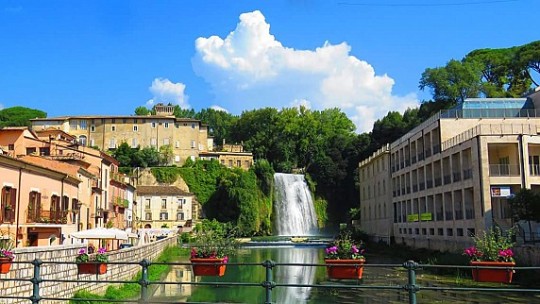
Una cascata fuori dalla porta di casa?
Sì! Se la cascata si trova in un piccolo borgo della Ciociaria, per l'esattezza in provincia di Frosinone e per la precisione a Isola del Liri.
Ma vediamo alcune note tratte dal sito
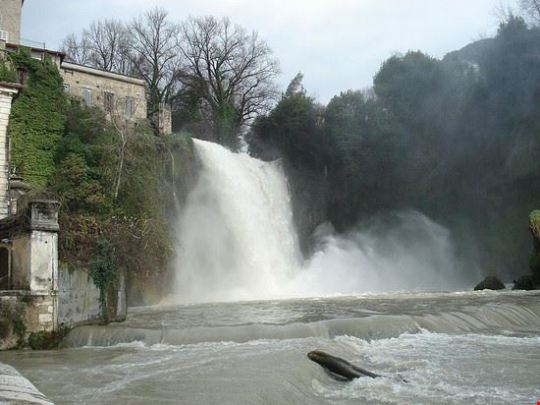
Isola del Liri (anche nota come Lisëra in dialetto) è un comune italiano che appartiene alla provincia di Frosinone e conta circa 11.800 abitanti distribuiti all'interno di una superficie di 16,01 chilometri quadrati. Il centro cittadino sorge proprio all'interno di una piccola isola formata dal fiume Liri, in un tratto in cui si biforca in due bracci all'altezza dal Castello Bomcompagni - Viscogliosi, formando due salti di nome Cascata grande e Cascata del Valcatoio: entrambe sono alte circa 27 metri, ma il salto della seconda non è perfettamente verticale, visto che segue un piano inclinato con una pendenza del 17%. Dal punto di vista climatico Isola del Liri presenta temperature tendenzialmente calde e non difformi a quelle del resto della sua zona di appartenenza, con precipitazioni concentrate soprattutto durante la stagione invernale: il mese più freddo dell'anno è gennaio, durante il quale si registra una media di 5.5 °C, mentre il più caldo è luglio, durante il quale si registra una media di 22.5 °C. La storia di Isola del Liri è, come è facile intuire, strettamente legata a quella della vicinissima Roma e, volendo stringere il tiro, innanzitutto a quella dei due municipi romani vicini di Arpinum
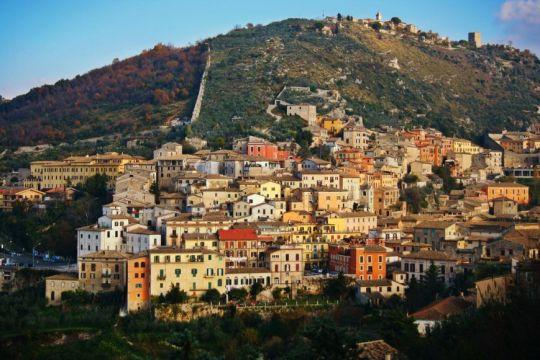
e Sora, che un tempo si spartivano il suo territorio comunale. Non a caso per anni la località è stata nota anche come "Isola di Sora" (o "Isola presso Sora") ed avrebbe ottenuto il suo toponimo attuale soltanto nel 1869. Con la caduta dell'Impero la città cadde prima sotto il dominio bizantino, quindi sotto quello longobardo, per poi venire nuovamente accorpata alla contea di Sora nel Principato di Capua. Gli anni del cosiddetto Ancien Régime sono anni di grande sviluppo per Isola del Liri, che deve molto all'opera della famiglia Boncompagni e a quella dei nobili del Ducato di Sora. Proprio in questi anni il comune sarebbe poi stato teatro di un noto eccidio compiuto dall'esercito rivoluzionario nella Chiesa di San Lorenzo Martire nel maggio del 1799.
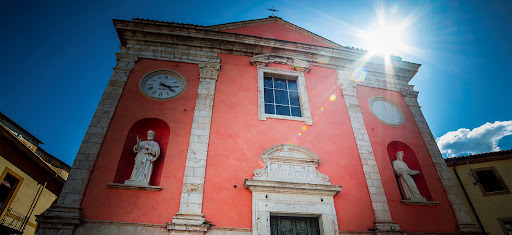
Il successivo XIX secolo è quello dello sviluppo industriale e della nascita di diversi cantieri nella vicina Valle del Liri, con particolare predilezione per la fabbricazione e la lavorazione della carta e non a caso nel Novecento il centro era uno dei pochi della zona a disporre di energia elettrica. Uno sviluppo che, come è facile intuire, sarebbe stato bruscamente fermato dalla Prima guerra mondiale, ma che poi invece avrebbe attraversato la seconda senza particolari intoppi nonostante alcuni drammatici bombardamenti da parte degli alleati. La stabilità economica di Isola del Liri ha attraversato gli anni del boom e ancora oggi rende la località un caso più unico che raro di cittadina della provincia di Frosinone con un elevato tasso di benessere, un sistema locale organizzato ed un'istruzione media particolarmente significativa. Non a caso dunque, nonostante le sue piccole dimensioni, ha dato i natali a diverse personalità arrivate ad eccellere nel proprio campo di competenza: dall'astronomo Federico Zuccari a Giustiniano Nicolucci, fondatore dell'antropologia italiana; dalla poetessa Gianna Sarra al regista Daniele Costantini,

passando per Bruno Magliocchetti, politico locale, ex sindaco e senatore della Repubblica. Isola del Liri dista circa 23 chilometri dal suo capoluogo di provincia Frosinone, a cui è collegata principalmente dalla Strada Regionale SR214 Maria e Isola Casamari; un'altra importante arteria locale è la Strada Statale 82 della Valle del Liri, che da Sora sale attraversando tutta la valle ed arrivando fino ad Avezzano in Abruzzo. Detto ciò Isola del Liri è servita a livello ferroviario dalla stazione Avezzano - Roccasecca,
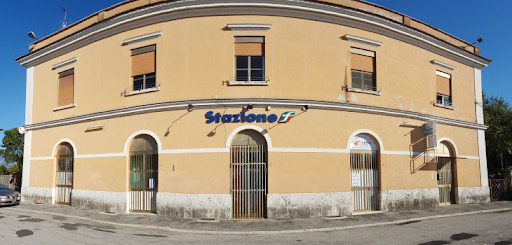
mentre per prendere un volo è necessario muoversi fino all’aeroporto di Ciampino o all’aeroporto di Fiumicino: il primo dista circa 100 chilometri dal centro abitato, il secondo circa 130.
0 notes
Text

He was in many respects very similar to Cicero. He was almost the same age, clever and amusing, a gifted philosopher. The two had grown up together in Arpinum, been schooled together in Rome, and travelled together in the East. But there was one huge difference: Lucius entirely lacked worldly ambition. He lived alone, in a small house full of books, and did nothing all day except read and think - a most dangerous occupation for a man, which in my experience leads invariably to dyspepsia and melancholy. imperium - robert harris
0 notes
Video
youtube
Cícero: o silêncio é poderoso em um mundo que fala demais #ebook
Marcus Tullius Cicero foi um estadista romano, advogado, estudioso, filósofo, escritor e cético acadêmico que procurou defender princípios ideais durante as crises políticas que levaram ao estabelecimento do Império Romano.
Nascido em 3 de janeiro de 106 a.C., em Arpinum, Itália, a influência de Cícero foi generalizada, pois se envolveu em diversos campos de estudo e discurso.
Suas obras, incluindo tratados sobre retórica, filosofia e política, cobriram uma ampla gama de tópicos, incluindo casos jurídicos, questões políticas e filosóficas.
Os tratados filosóficos de Cícero exploraram temas como ética, política e a natureza dos deuses, influenciados pelo estoicismo e pelo ceticismo acadêmico. Ele ocupou vários cargos políticos, incluindo cônsul, e esteve profundamente envolvido na turbulência política de sua época.
Os seus escritos refletiam frequentemente as suas preocupações políticas e usavam as suas capacidades retóricas para defender os princípios da República contra ameaças potenciais.
O legado de Cícero estendeu-se para além da sua época, à medida que os seus escritos continuaram a ser estudados e admirados durante a Idade Média e o Renascimento.
SABER MAIS SOBRE FILOSOFIA https://amzn.to/3qFP3Kl
SABER MÁS SOBRE FILOSOFÍA https://amzn.to/3OKfhDv
KNOW MORE ABOUT PHILOSOPHY https://amzn.to/3QGQPpg
0 notes
Text
Cicero: Roma Döneminin Ünlü Siyasetçisi, Filozofu ve Yazarı
Cicero, Roma Cumhuriyeti döneminin en ünlü siyasetçileri, filozofları ve yazarlarından biridir. Roma Cumhuriyeti’nin altın çağına denk gelen dönemde yaşamış olan Cicero, hem siyasi hem de felsefi alanda birçok önemli katkıda bulunmuştur. Hayatı ve Eğitimi Cicero, MÖ 106 yılında Roma’nın Arpinum kentinde doğdu. Ailesi, ileri görüşlü ve zeki bir soylu aileydi ve Cicero, Roma’da iyi bir eğitim…

View On WordPress
0 notes
Text
Chapter 44: Farewells and Proposals
“It’s strange to think of him gone,” Cicero said, looking around at the home in which he’d grown up. “Father should have told me he was having trouble keeping up with the place. It’s not what I expected to find at all.”

He was right, of course. The peristyle garden, always so beautiful in memory, had fallen into complete disrepair. In fact, the entire house was a mere shadow of its former self. What had once been a graceful – if understated – villa was now barely more than a collection of cracked stones and overgrown ivy.
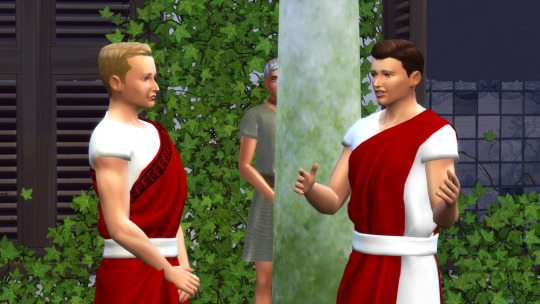
“It’s nothing that can’t be fixed, Marcus,” Quintus said. “After all, it’s all yours now.”
Word of their father’s death had reached us in Rome two days before. Rushing to Arpinum, the brothers laid their father to rest with great ceremony. Yet his death had struck them both to the core.
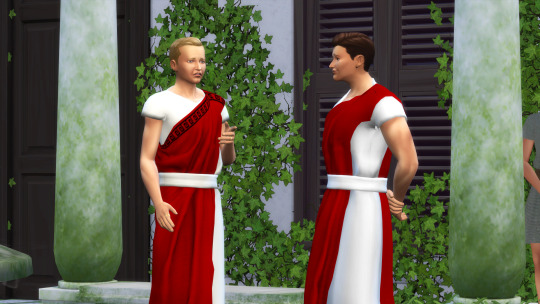
“You know, I wouldn’t be who I am today without his guidance and support,” Cicero said. “It was his idea to send me to Rome to further my education and take my place in the senate. He could have easily been content having me follow him here – the kind country gentleman watching over his people.”

“He knew you would never have been content with that,” Quintus said, smiling sadly. “So he did what was necessary to give you the right start in life. And me after you.”
“Well, I suppose I must make repairs then,” Cicero said. “This land is what bought my entry into the senate. I’ll never part with it. It’s our home and birthright.”
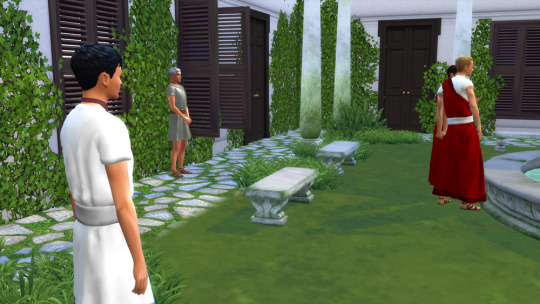
As the two brothers walked around, pointing out necessary repairs or improvements, I stood thinking, for the first time in my life, that I might enjoy a more peaceful existence in a place like this – or even a home of my own. Both of my parents had served Cicero’s father, and I had been fortunate that the old man had sent me off to school to learn to read and write. Otherwise, I would likely still be here working myself into an early grave, as my parents did before me.
That night, I worked up the courage to voice my desire to Cicero. But I already knew what his answer would be.
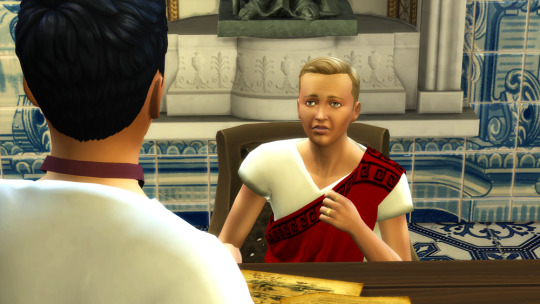
“No, Tiro,” he said, smiling kindly. “I, too, hear the call of this land. It is our home, and our lives will forever be connected to it. But this is our time – mine and yours. I could not do without your assistance, for I have much higher to rise. And when I rise, so will you. Eventually to freedom – that much I promise you! But not yet, not yet. We have too much to do before we rest, my friend.”
Thus were my dreams of life as a country gentleman snuffed out. For no sooner as he had given his answer did a messenger arrive with a letter. Cicero bade me summon Quintus immediately.
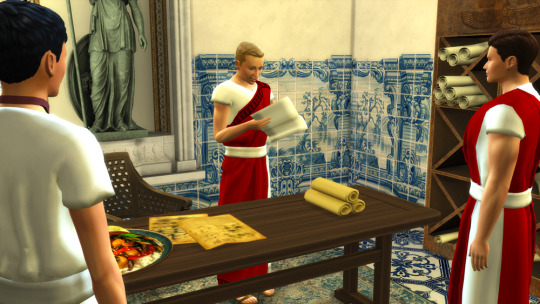
“It is from Pompey,” Cicero said. “There has been a great disaster. The grain fleet, in port at Ostia, was raided by pirates. Most of the ships were either stolen or burned, and Rome is at risk to go hungry this winter.”
“Pompey, I assume, wishes to respond?” Quintus asked.

“Of course,” Cicero replied, grinning weakly. “He is calling a council of war at his villa in the Alban Hills day after tomorrow, and wishes me to attend him there. Tiro, you’ll accompany me.”
“And I?” Quintus asked, irritated at once again being left out of the great events of his time.
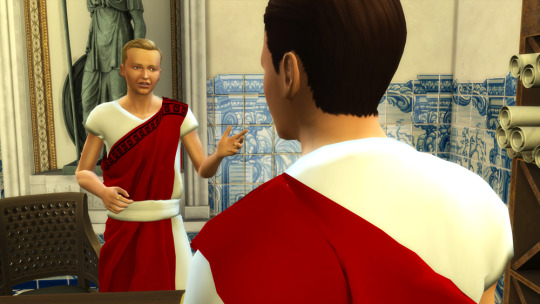
“You will return to Rome with Terentia, your wife and the children,” Cicero said. “I promise I’ll give you a full account of what happens, brother, but I don’t want either of our families travelling alone!”
BEGINNING | PREV | NEXT
#ts4 simblr#simblr#ts4 historical#historical simblr#ts4 story#ancient rome#marcus tullius cicero#a farewell to father#urgent news#chapter 44#farewells and proposals#summoned by pompey
16 notes
·
View notes
Photo

3 January - in 106 BC, the Roman orator & statesman Marcus Tullius Cicero is born at Arpinum. His speeches, letters, and other writing provide a telling - if biased - insight into the murky world of Late Republican politics
6 notes
·
View notes
Text
Today’s shitpost: my inexplicably favorite passage of Caesar’s Women
“Can you manage to get hold of a bust or a statue of Saturninus? Or of your uncle Quintus Labienus?”
“I can go one better than that,” said Labienus promptly. “I know where there’s an imago of Saturninus.”
“An imago! But he was never praetor!”
“True,” said Labienus, grinning. “The trouble with being a great nobleman, Caesar, is that you can have no idea how our minds work, we ambitious up and coming Picentines, Samnites, New Men from Arpinum and the like. We just can’t wait to see our features exquisitely formed and tinted like life in beeswax, with real hair of exactly the right color and style! So as soon as we have the money in our purses we sneak off to one of the craftsmen in the Velabrum, and we commission an imago. I know men who will never even belong to the Senate who have imagines. How else do you think Magius of the Velabrum got so rich?”
#tagamemnon#fictalk#colleen mccullough#masters of rome#caesar's women#gaius julius caesar#titus labienus#maybe it's because caesar is the one getting taught something for once
11 notes
·
View notes
Text
in today's letter: cicero has apparently been bombarding tiro with letters! his financial situation is once again: bad! cicero is still hasn't paid back terentia's dowry! dolabella still hasn't paid back tullia's dowry! and cicero asks tiro what the Vibe is after octavian marched on rome!
about e-pistulae | previous letters | subscribe to emails from cicero?
32 notes
·
View notes